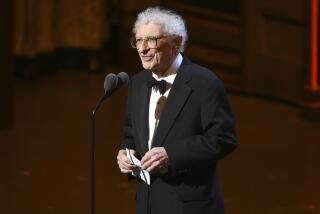SONNY SHARROCK : Guitarist Rediscovers the ‘Heart of Melody’
- Share via
“They’re all totally different sides of my personality,” said guitarist Sonny Sharrock of his three albums being released this summer.
“I was in three very distinct roles . . . I guess it’s like an actor going to work,” said the man who was revered and reviled as the godfather of avant-noise electric guitar during jazz’s free-improvising phase in the 1960s.
One of his new albums, “Faith Moves” on CMP Records, is a textured, melodic collection which features Sharrock working in a duo with New York guitarist Nicky Skopelitis.
“Nightlife,” the most recent recording by Sharrock’s regular working quintet on the Enemy label, has more of an instrumental rock sound.
Sharrock is closest to the free-form jazz style associated with his early career in “Ask the Ages,” an Axiom Records release that reunites him with two of his ‘60s compatriots: saxophonist Pharaoh Sanders and drummer Elvin Jones.
The guitarist found it a tough readjustment to step back to the playing and writing style of 25 years ago.
“I found myself writing (for the “Ages” album) the way I do now for my quintet,” Sharrock said by phone from his Long Island home. “That (didn’t work) for these guys--I had to scrap everything, start again and try to write in the manner that we played back then. You have to write for the people who are going to play the music.”
Sharrock, who’ll be 51 next month, was involved with R&B; vocal groups during the doo-wop era before turning to jazz. Enamored of John Coltrane but unable to play saxophone due to asthma, Sharrock switched to electric guitar and worked in the ‘60s with groups led by Sanders and flutist Herbie Mann. He appeared on Wayne Shorter and Miles Davis albums in the late ‘60s and early ‘70s, and released his first three albums as a leader between 1969 and 1975.
Sharrock went through a “developmental” phase in his music before raising his profile in the early ‘80s through his work in Material and Last Exit, two experimental units that include bassist-producer Bill Laswell. That set the stage for “Guitar,” the stunning 1985 solo album which Sharrock credited as the starting point of his ongoing career resurgence.
“From that point on, I could see that for me it was all within the melody,” Sharrock reflected. “The more simple the melody, the stronger the melody--and the stronger the melody, the more I was going to play. I’m still hellbent on going all the way to the heart of melody.”
More to Read
The biggest entertainment stories
Get our big stories about Hollywood, film, television, music, arts, culture and more right in your inbox as soon as they publish.
You may occasionally receive promotional content from the Los Angeles Times.










